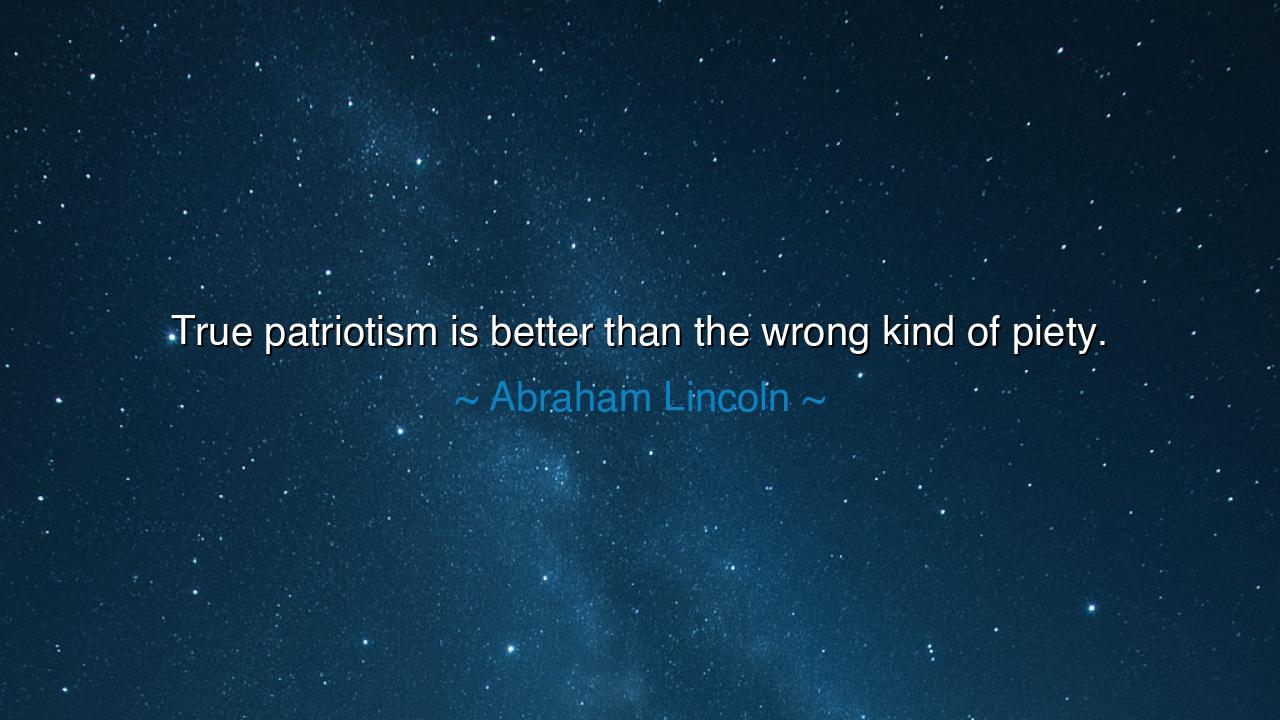
True patriotism is better than the wrong kind of piety.






The sage and statesman Abraham Lincoln once observed: “True patriotism is better than the wrong kind of piety.” In these words lies a profound meditation on the moral essence of patriotism. Lincoln contrasts authentic devotion to one’s country with empty displays of ritual or ostentation—piety that is misdirected, superficial, or self-serving. True patriotism, he implies, is active, ethical, and committed to the welfare of the nation, whereas false piety may be ornamental, hollow, or detached from moral responsibility.
In the wisdom of the ancients, virtue was measured by action rather than words or ceremony. Aristotle emphasized that excellence resides in practice, not merely in formal observance. Lincoln’s insight mirrors this understanding: patriotism is validated by deeds that uphold justice, defend liberty, and promote the common good. Mere ritual, whether in devotion to a deity or a nation, is insufficient if it does not translate into service, courage, and moral responsibility.
The origin of this quote is rooted in Lincoln’s experience during the American Civil War, a time when the nation faced profound moral and existential challenges. Amid debates over loyalty, religion, and civic duty, Lincoln recognized that true allegiance to the nation demanded courage, judgment, and ethical commitment, rather than perfunctory expressions of reverence or ceremonial displays. In this context, patriotism becomes a measure of one’s contribution to the survival, justice, and integrity of the nation.
History provides resonant examples. Consider the Founding Fathers, many of whom navigated the delicate balance between faith, personal conviction, and civic responsibility. George Washington, for instance, demonstrated reverence for divine guidance, yet his patriotism was expressed through decisive action, leadership, and moral courage, not mere prayer or ritual. Lincoln’s insight reminds us that devotion to principle—whether spiritual or national—must be animated by practical engagement in service to the common good.
Lincoln’s words also highlight the danger of misplaced or performative devotion. Citizens or leaders who claim allegiance without action, or who mask self-interest as piety, fail both the nation and morality. True patriotism is courageous, principled, and tangible; it requires the willingness to confront injustice, sacrifice personal comfort, and act in defense of liberty. Hollow displays, no matter how outwardly virtuous, cannot sustain a nation or its ideals.
Consider the story of Frederick Douglass, who challenged a nation’s moral and civic conscience during the era of slavery. His patriotism was expressed not in ritual or deferential piety but in fearless advocacy, eloquent moral reasoning, and relentless pursuit of justice. Douglass exemplifies Lincoln’s principle: allegiance to one’s country is measured by ethical action, courage, and the pursuit of the nation’s highest ideals, not by performative displays of devotion.
The lesson for all generations is unmistakable: true patriotism demands action, courage, and moral integrity. It is a devotion that manifests in ethical leadership, civic engagement, and the defense of liberty, justice, and equality. Ritual, ceremony, or empty devotion, no matter how ostentatious, cannot substitute for the practical and moral demands of genuine allegiance to the nation.
Practically, this calls citizens to cultivate awareness, courage, and responsibility. Engage in civic life, defend the vulnerable, uphold justice, and act in service to the nation’s moral and ethical principles. Question performative or hollow displays of loyalty, and measure patriotism by deeds rather than symbols. In doing so, one embodies Lincoln’s wisdom: true patriotism is active, principled, and ethical, and it surpasses any form of hollow or misdirected piety.






AAdministratorAdministrator
Welcome, honored guests. Please leave a comment, we will respond soon